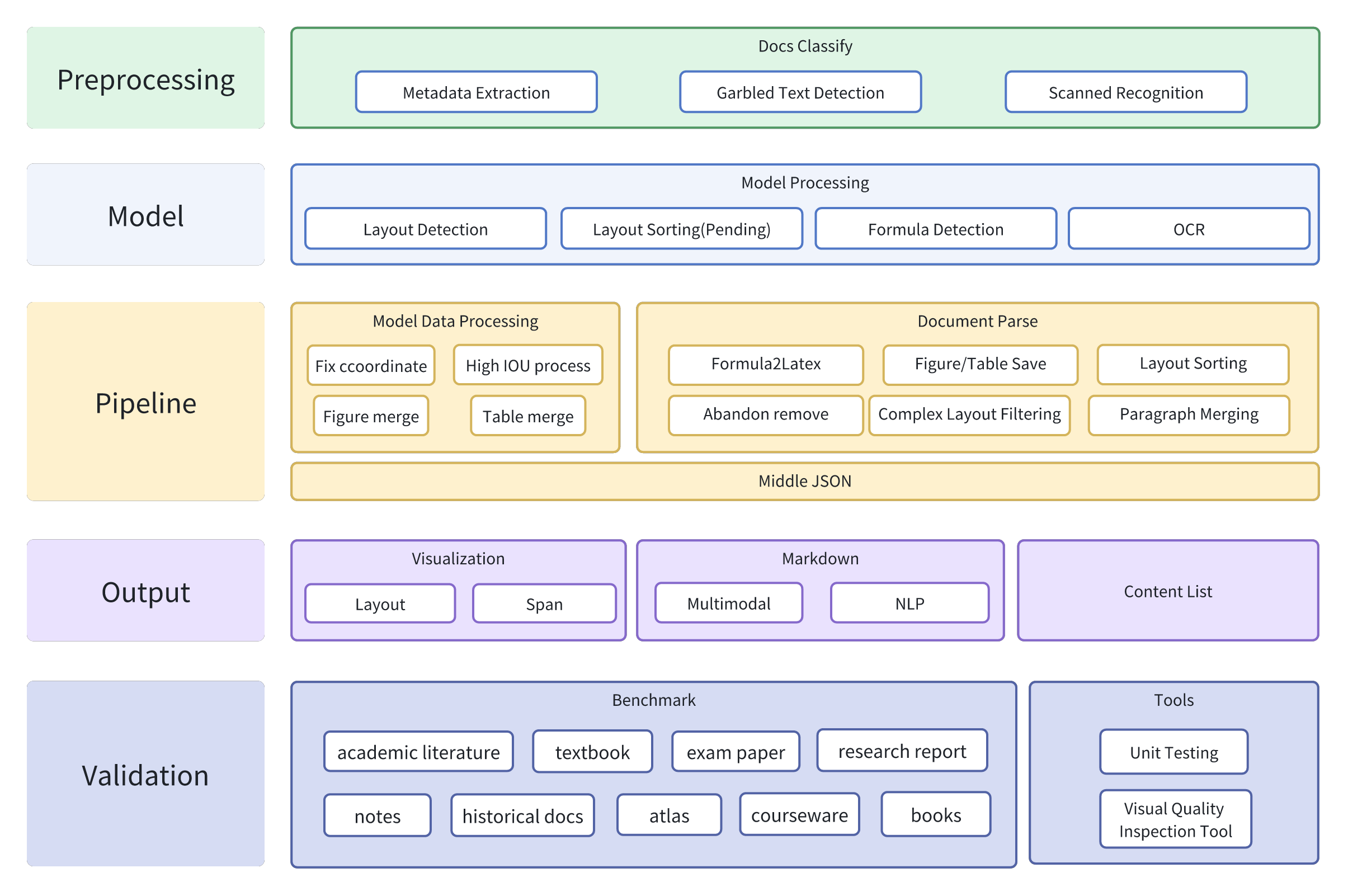MinerU: An end-to-end PDF parsing tool based on PDF-Extract-Kit, supporting conversion from PDF to Markdown.🚀🚀🚀
PDF-Extract-Kit: A Comprehensive Toolkit for High-Quality PDF Content Extraction🔥🔥🔥
MinerU is a one-stop, open-source, high-quality data extraction tool, includes the following primary features:
Magic-PDF is a tool designed to convert PDF documents into Markdown format, capable of processing files stored locally or on object storage supporting S3 protocol.
Key features include:
- Support for multiple front-end model inputs
- Removal of headers, footers, footnotes, and page numbers
- Human-readable layout formatting
- Retains the original document's structure and formatting, including headings, paragraphs, lists, and more
- Extraction and display of images and tables within markdown
- Conversion of equations into LaTeX format
- Automatic detection and conversion of garbled PDFs
- Compatibility with CPU and GPU environments
- Available for Windows, Linux, and macOS platforms
pdf_zh_cn.mp4
- Python >= 3.9
Using a virtual environment is recommended to avoid potential dependency conflicts; both venv and conda are suitable. For example:
conda create -n MinerU python=3.10
conda activate MinerUInstall the full-feature package with pip:
Note: The pip-installed package supports CPU-only and is ideal for quick tests.
For CUDA/MPS acceleration in production, see Acceleration Using CUDA or MPS.
pip install magic-pdf[full]==0.6.2b1❗️❗️❗️ We have pre-released the 0.6.2 beta version, addressing numerous issues mentioned in our logs. However, this build has not undergone full QA testing and does not represent the final release quality. Should you encounter any problems, please promptly report them to us via issues or revert to using version 0.6.1.
pip install magic-pdf[full-cpu]==0.6.1
The full-feature package depends on detectron2, which requires a compilation installation.
If you need to compile it yourself, please refer to facebookresearch/detectron2#5114
Alternatively, you can directly use our precompiled whl package (limited to Python 3.10):
pip install detectron2 --extra-index-url https://myhloli.github.io/wheels/For detailed references, please see below how_to_download_models
After downloading the model weights, move the 'models' directory to a directory on a larger disk space, preferably an SSD.
You can get the magic-pdf.template.json file in the repository root directory.
cp magic-pdf.template.json ~/magic-pdf.jsonIn magic-pdf.json, configure "models-dir" to point to the directory where the model weights files are located.
{
"models-dir": "/tmp/models"
}If you have an available Nvidia GPU or are using a Mac with Apple Silicon, you can leverage acceleration with CUDA or MPS respectively.
You need to install the corresponding PyTorch version according to your CUDA version.
This example installs the CUDA 11.8 version.More information https://pytorch.org/get-started/locally/
pip install --force-reinstall torch==2.3.1 torchvision==0.18.1 --index-url https://download.pytorch.org/whl/cu118❗ ️Make sure to specify version
torch==2.3.1 torchvision==0.18.1in the command, as these are the highest versions we support. Failing to specify the versions may result in automatically installing higher versions which can cause the program to fail.
Also, you need to modify the value of "device-mode" in the configuration file magic-pdf.json.
{
"device-mode":"cuda"
}For macOS users with M-series chip devices, you can use MPS for inference acceleration.
You also need to modify the value of "device-mode" in the configuration file magic-pdf.json.
{
"device-mode":"mps"
}magic-pdf pdf-command --pdf "pdf_path" --inside_model trueAfter the program has finished, you can find the generated markdown files under the directory "/tmp/magic-pdf".
You can find the corresponding xxx_model.json file in the markdown directory.
If you intend to do secondary development on the post-processing pipeline, you can use the command:
magic-pdf pdf-command --pdf "pdf_path" --model "model_json_path"In this way, you won't need to re-run the model data, making debugging more convenient.
magic-pdf --helpimage_writer = DiskReaderWriter(local_image_dir)
image_dir = str(os.path.basename(local_image_dir))
jso_useful_key = {"_pdf_type": "", "model_list": []}
pipe = UNIPipe(pdf_bytes, jso_useful_key, image_writer)
pipe.pipe_classify()
pipe.pipe_parse()
md_content = pipe.pipe_mk_markdown(image_dir, drop_mode="none")s3pdf_cli = S3ReaderWriter(pdf_ak, pdf_sk, pdf_endpoint)
image_dir = "s3://img_bucket/"
s3image_cli = S3ReaderWriter(img_ak, img_sk, img_endpoint, parent_path=image_dir)
pdf_bytes = s3pdf_cli.read(s3_pdf_path, mode=s3pdf_cli.MODE_BIN)
jso_useful_key = {"_pdf_type": "", "model_list": []}
pipe = UNIPipe(pdf_bytes, jso_useful_key, s3image_cli)
pipe.pipe_classify()
pipe.pipe_parse()
md_content = pipe.pipe_mk_markdown(image_dir, drop_mode="none")Demo can be referred to demo.py
Magic-Doc is a tool designed to convert web pages or multi-format e-books into markdown format.
Key Features Include:
-
Web Page Extraction
- Cross-modal precise parsing of text, images, tables, and formula information.
-
E-Book Document Extraction
- Supports various document formats including epub, mobi, with full adaptation for text and images.
-
Language Type Identification
- Accurate recognition of 176 languages.
extract1.mp4
extract2.mp4
extract3.mp4
- Magic-Doc Outstanding Webpage and E-book Extraction Tool
The project currently leverages PyMuPDF to deliver advanced functionalities; however, its adherence to the AGPL license may impose limitations on certain use cases. In upcoming iterations, we intend to explore and transition to a more permissively licensed PDF processing library to enhance user-friendliness and flexibility.
@article{he2024opendatalab,
title={Opendatalab: Empowering general artificial intelligence with open datasets},
author={He, Conghui and Li, Wei and Jin, Zhenjiang and Xu, Chao and Wang, Bin and Lin, Dahua},
journal={arXiv preprint arXiv:2407.13773},
year={2024}
}
@misc{2024mineru,
title={MinerU: A One-stop, Open-source, High-quality Data Extraction Tool},
author={MinerU Contributors},
howpublished = {\url{https://github.com/opendatalab/MinerU}},
year={2024}
}







